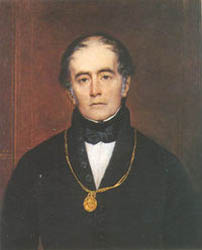Andrés Bello (1781-1865)
Andrés
de Jesús María y José Bello López (Andrés Bello) was born in Caracas in 1781. He was one of Latin America's most important humanists in the
neoclassical tradition. He was poet, philologist, educator, and politician. His
written style is elegant and traditional in that he works within the formal
rules of Enlightenment style. His moral values also parallel those of the French
enlightenment: peace, virtue, and reconciliation with the metropolis, Spain. He adds
new images to his descriptions of the American countryside that he loved so
much. In fact, he expresses a glorification of rural scenes rather than urban
ones. Although European culture made the transition from the Enlightenment to
the Romanticism during his lifetime, nevertheless, he resisted the latter. He
translated Victor Hugo and Lord Byron to Spanish, but he did not adopt their
style or tone completely. He was never a revolutionary, for his patriotic ideal
an enlightened monarchy. He advocated modernizing Latin
America progressively, not through revolution or sudden change. From
1797 to 1800, he attended the University
of Caracas (Real y
Pontificia Universidad de Caracas). Subsequently, he gave private tutor for the
elite Society of Caracas. Among his students was Simón Bolívar. In 1800, Bello accompanied the
famous German naturalist Alexander von Humboldt in exploring various Venezuelan
mountains.
Bello's
second period covers the years from 1810 to 1829. Until 1810, he lived in the
capital of the province of Venezuela (Capitanía General de Venezuela) within the
Viceroyalty of New Granada, but that year he traveled to England, where,
as Simón Bolívar's aid, he joined the campaign for independence. In London he studied
languages, literature, philosophy, history, science, and law. In 1814, he
married an English woman, Mary Ann Boyland. They had three children. She died of
tuberculosis in 1821, and he remarried in 1824. As a firmly dedicated neoclassicist.
Interestingly, he invoked poetry as a reason to return to Latin America from Europe. He felt that Latin American nature and history inspired
poetry more than Europe did. He expressed
nostalgia, love, longing, emotion for America, and he liked the fact that
Latin Americans were shaking off the yoke of their colonial past.
Bello's
third period goes from 1829 to his death in 1865. In 1829 he went to Chile with his
second wife. In Chile,
he worked for the government in areas relating to law and the humanities. In
fact, he was so successful that he was granted Chilean citizenship. In Santiago, he was both a
senator and a professor. At the same time he continued his journalistic
activities. When he met his great Argentinian contemporary Domingo Faustino Sarmiento
in Chile,
the debate between Neoclassicism and Romanticism began. He was the driving
force behind creation of the important legal document, the Civil Code of the Republic of Chile
(Código Civil de la República de Chile). Also, he was instrumental
in creating the University
of Chile in 1842. Bello
became its first president, and he remained in that post until his death. In
1851 he was made an honorary member of the Spanish Royal
Academy (Real Academia
Española).
Among his main works are
a grammar of Latin, a grammar of the Spanish language (Gramática de la lengua castellana destinada al uso de los americanos),
poetry ("A la victoria de Bailén", "Alocución a la Poesía",
"A la agricultura de la Zona Tórrida"), and a history of Venezuela.



